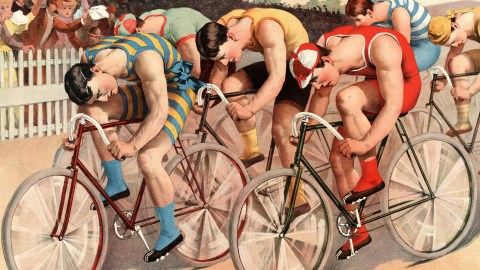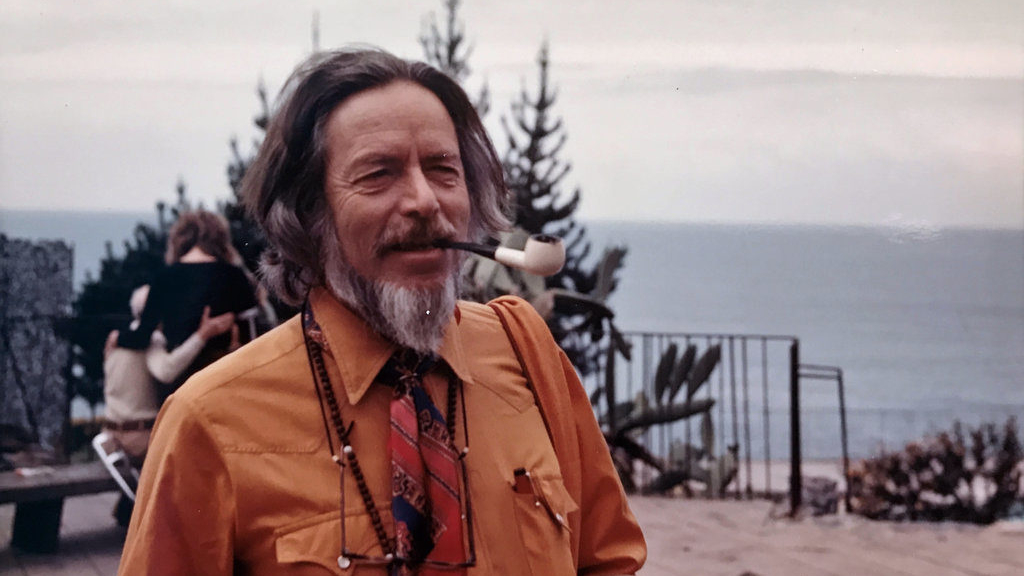Wittgenstein on wheels: Why the cycling counterculture embraced philosophy

For nearly as long as I can remember, I’ve had the inexplicable feeling that just beyond the purview of the rational was not mere nonsense and superstition, but an alternative way of confronting existence which had become obscured – eclipsed not just by social constraints, but by my own predilection for endless thinking. In many cases, the vague sense of loss over this way of viewing the world goes back to the basic question of who you are – deep down and outside of an ever-calculating frame of mind. It’s easy to conflate your very existence with the processes of your brain – ideas or symbols for reality itself – and when you do, something fundamental about what it is to be alive is bound to be lost.
You’re distanced not just from your own body (a sort of machine which is ultimately doomed to failure), but the particulars of the world are substituted for universal concepts – in other words, abstractions which have been drained of their vitality and dynamism. There is little doubt that abstract modes of thought which ask pointed questions about the function of the natural world have elevated vast swathes of the population from ‘short, nasty and brutish’ lives of superstition and premature death, into the light of reason, but it’s naïve to think that this has been without cost.
These costs, and the natural and age-old conflict between the rational and romantic temperaments, came to the forefront in twentieth-century philosophy with central figures making claims about what philosophy could, and perhaps more importantly, could not hope to make sense of. In many ways, this question as to the limits of rational thought is at the root of the division which took place between so-called ‘analytic’ or Anglo-American philosophy, and the school of ‘Continental philosophy’ which grew out of the intellectual milieu of post-war Germany and France.
Attempting to delimit and circumscribe all intelligible and therefore ‘legitimate’ questions, Ludwig Wittgenstein – undoubtedly one of the most important philosophers of the twentieth century – begins his Tractatus Logico-Philosophicus with the grounding statement, ‘The world is all that is the case,’ proceeding, brick by brick, to construct the logical terms of the world and to police the domain of valid philosophical inquiry. But Wittgenstein was not a mere positivist or materialist. With the sense that something ineffable remains outside the scope of rational language, near the conclusion of the Tractatus, Wittgenstein famously writes ‘There are, indeed, things that cannot be put into words. They make themselves manifest. They are what is mystical.’
By the time Wittgenstein was writing the Tractatus in the early 1920s, the West – particularly Britain and the United States – had already largely lost its taste for mystical, ‘ultimate questions’ about life and death, meaning and existence. Often construed as fuzzy, and conceptually sloppy, the very idea of the mystical had withered. Since the Enlightenment, progress had been the result of hard-nosed pragmatism coupled with Protestant practicality which sought to pose only the sort of questions which were amenable to empirical answers, and more often than not, that meant scientific questions. Ideas about the soul – about meaning and purpose – had necessarily retreated to art, religion, small corners of philosophy like existentialism, and, while it may at first appear unlikely, to the realm of sport.
While the ascetic suffering induced by exertion and exposure to the elements is central to cycling’s connection to questions of meaning and purpose, it wasn’t merely the physical, experiential aspects of the sport, but also certain cultural elements which made the sport so attractive to those who remained attuned to the transcendent. Cycling has always been a bastion for romantic reactionaries – for outsiders who feel that perhaps something is amiss with modern society (or perhaps with him or herself) and it’s difficult to overstate just how connected the revival of the sport was in the English-speaking world to the 1960s and ’70s counterculture.
Long before sports science, and Team Sky’s ‘marginal gains’ approach, mid-ride stops to smoke marijuana at the top of a climb weren’t uncommon.
Led by loners, hippies, and oddballs, the sport’s churches were cluttered bicycle shops where the grace of Tom Simpson’s pedaling style and exotic Italian bicycles with names like Masi, Colnago, De Rosa and Pinarello on their down tubes were discussed along with music, philosophy, and literature. This interest in cycling wasn’t merely technical or sporting, but instead spurred on by ideas of living differently and of rejecting mainstream consumer culture which for many had come to feel both ossified and vacuous. Simply put, at the time, normal gainfully employed adults didn’t ride bicycles for either pleasure or enjoyment. And, though several generations removed, it was this version of cycling, rather than the hyper-competitive sport that it now is, that I was drawn to.
This convergence of cycling and the counterculture with its famous edicts to ‘question reality’ and ‘turn on, tune in and drop out’ had strong roots in the San Francisco Bay Area where I grew up. Long before sports science, and Team Sky’s ‘marginal gains’ approach, mid-ride stops to smoke marijuana at the top of a climb weren’t uncommon, and as I experienced the solitary freedom of the bicycle the implicit message from early club mates and mentors was that spending one’s life behind a desk in service of a corporation’s agenda would be the worst sort of soul-crushing failure. It wasn’t only the abstract and heady desire to escape the hyper-rational, but also riding and racing a bicycle in a country which had little historical ties to the sport which engendered this outsider perspective, and my first cycling club, the Garden City Wheelmen, epitomized the links between cycling and the vestiges of the sixties which still remained in the Bay Area of the 1990s.





